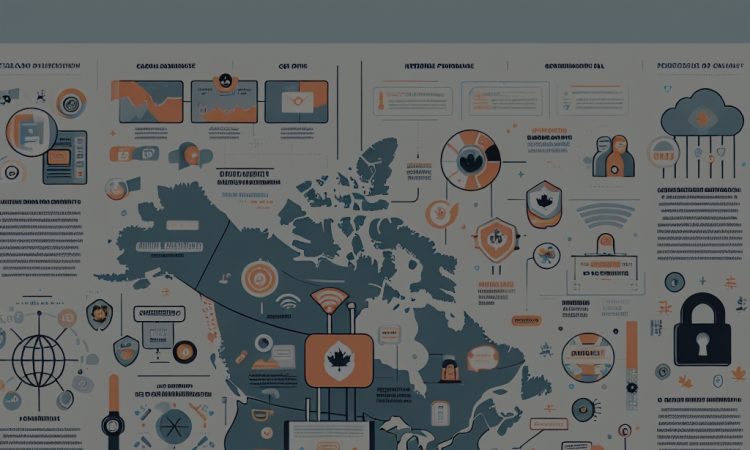
In the digital age, where the flow of information is instantaneous and often unregulated, understanding data privacy laws has become crucial for both individuals and businesses. Canada has made significant strides in establishing a robust legal framework to protect personal information in an increasingly online environment. This article explores the evolution of data privacy laws in Canada, key principles and provisions contained within the legislation, and the implications for businesses and individuals navigating the complexities of data privacy in the digital landscape.
The Evolution of Data Privacy Laws in Canada: Key Milestones
The journey towards comprehensive data privacy laws in Canada began in the late 20th century, culminating in the enactment of the Personal Information Protection and Electronic Documents Act (PIPEDA) in 2000. This landmark legislation marked Canada’s commitment to protecting personal data in the private sector, reflecting the growing recognition of individuals’ rights over their personal information. PIPEDA introduced a framework for the collection, use, and disclosure of personal information, establishing the need for consent and transparency.
In 2015, the Digital Privacy Act amended PIPEDA, reinforcing the importance of data security and accountability. This amendment included mandatory reporting of data breaches, a critical move that aimed to enhance consumer protection. The act also emphasized the need for organizations to demonstrate compliance with privacy regulations, thereby increasing accountability within the private sector.
The introduction of the Personal Information Protection Act (PIPA) in certain provinces, such as British Columbia and Alberta, illustrated a provincial commitment to privacy rights. While these provincial laws are similar to PIPEDA, they operate independently and reflect regional nuances in addressing data privacy concerns. This dual-layer approach highlights Canada’s commitment to safeguarding personal information across federal and provincial jurisdictions.
Finally, the announcement of the Digital Charter Implementation Act in 2020 set the stage for a renewed focus on privacy protection. The proposed legislation aims to modernize Canada’s privacy framework by introducing new rights, such as the right to deletion, and enhancing individuals’ control over their personal data. This ongoing evolution showcases Canada’s dedication to adapting its policies in response to emerging technological challenges.
Key Principles and Provisions of Canada’s Privacy Legislation
Canada’s data privacy framework is built upon several key principles, articulated in both PIPEDA and provincial laws. Central to these principles is the concept of informed consent, which requires organizations to obtain explicit permission from individuals before collecting, using, or disclosing their personal information. This principle fosters transparency and empowers individuals to make informed choices regarding their data.
Another important principle is the purpose limitation, which dictates that organizations may only collect personal information for specific, legitimate purposes. This ensures that data is not collected excessively or stored indefinitely, thereby minimizing the risks associated with data breaches and unauthorized access. Organizations must also ensure that the information collected is relevant and necessary for the intended purpose, promoting responsible data management practices.
Data security and accountability are also critical components of Canada’s privacy legislation. Organizations are required to implement appropriate safeguards to protect personal information against loss, theft, or unauthorized access. This includes adopting measures such as encryption, access controls, and employee training to mitigate privacy risks. Furthermore, organizations must appoint privacy officers to oversee compliance with privacy policies and practices, reinforcing the accountability principle.
Finally, the legislation emphasizes individuals’ rights, including the right to access their personal information held by organizations and request corrections if the data is inaccurate. This empowers individuals to take control of their data and reinforces the notion that personal information is owned by the individual rather than the organization. As privacy laws continue to evolve, these fundamental principles will remain pivotal in shaping Canada’s approach to data privacy.
Implications for Businesses and Individuals in the Digital Age
For businesses, understanding and complying with Canada’s data privacy laws is essential to maintaining consumer trust and avoiding potential penalties. Non-compliance can result in significant fines, reputational damage, and legal repercussions. Organizations must prioritize data privacy by implementing robust privacy policies, conducting regular audits, and training employees on privacy best practices to ensure they remain compliant with evolving regulations.
Moreover, businesses that proactively adopt transparent data practices can differentiate themselves in a competitive marketplace. By prioritizing customer privacy, organizations can enhance their brand reputation and foster long-lasting relationships with consumers. In an era where consumers are increasingly aware of their data rights, transparency and ethical data practices can lead to increased customer loyalty and trust.
For individuals, Canada’s privacy laws provide essential protections for their personal information. By understanding their rights under the legislation, individuals can better navigate the complexities of the digital landscape and exercise control over their data. Individuals should actively engage with organizations to understand how their data is being used and assert their rights to access and correct their information when necessary.
As technology continues to evolve, individuals must also remain vigilant about the potential risks associated with sharing personal information online. This includes being cautious about the platforms they use and the data they share, as well as actively seeking out businesses that prioritize data privacy. In this way, both businesses and individuals play critical roles in upholding data privacy standards in Canada’s digital age.
In conclusion, Canada’s online data privacy laws reflect a commitment to protecting individual rights in an increasingly digitized world. As the legal landscape continues to evolve, it is crucial for businesses and individuals alike to stay informed about their responsibilities and rights concerning personal information. By fostering a culture of compliance, transparency, and respect for privacy, Canada can navigate the challenges of the digital age while safeguarding valuable personal data. Being aware of these laws not only enhances trust between consumers and organizations but also contributes to a more secure and responsible online environment.






